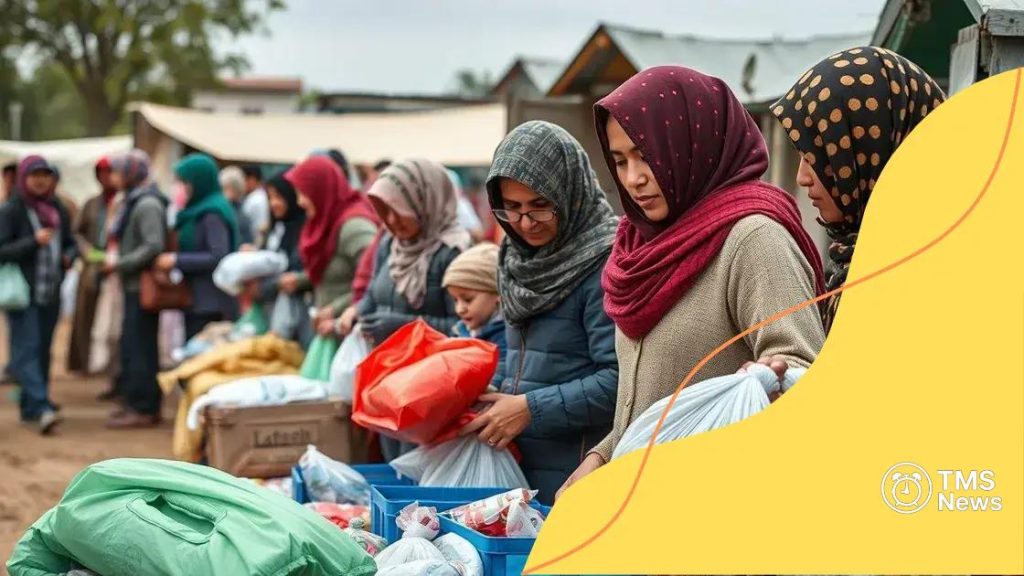Refugeeaid: What You Need to Know About Support Options

Anúncios
Refugees face significant challenges, including legal obstacles, social integration issues, and economic hardships, highlighting the importance of community support and awareness to improve their lives.
Refugeeaid is a vital lifeline, providing essential support to those who have been uprooted by conflict and hardship. Have you ever considered how your involvement can make a difference? Let’s dive into the various ways this initiative transforms lives.
Anúncios
Understanding the refugee crisis
The world is facing a serious challenge with the growing refugee crisis. This issue affects millions of lives, making it crucial to understand its roots and consequences. Around the globe, people are fleeing from violence, persecution, and conflict, seeking safety and a chance for a better future.
What Causes the Refugee Crisis?
Many factors contribute to the refugee crisis. Understanding these causes helps us see why people leave their homes. They include:
- Wars and Conflicts: Ongoing battles often force families to flee their countries.
- Persecution: People targeted for their beliefs, ethnicity, or sexual orientation seek safety elsewhere.
- Poverty and Disaster: Economic hardship and natural disasters push communities to find more stable living conditions.
Each of these factors plays a significant role in why people choose to become refugees. People don’t leave their homes lightly; they often risk everything to escape danger.
Anúncios
The Impact of the Refugee Crisis
The impact of the refugee crisis is felt worldwide, not just in the countries people leave. Host nations experience various challenges, such as:
- Strain on Resources: Refugees can put pressure on housing, healthcare, and education systems in their new countries.
- Cultural Change: As new communities emerge, existing cultures can evolve as they mix with refugee backgrounds.
- Economic Contributions: Despite the challenges, refugees often bring skills and are determined to contribute to their new communities.
Recognizing the complex nature of the refugee crisis allows individuals to see the beauty of resilience and hope that many refugees embody. Their stories of survival uplift us and remind us of our shared humanity. Exploring ways to support refugees and understanding their challenges can ignite positive change in our communities.
Different forms of aid in place
When it comes to addressing the refugee crisis, understanding the different forms of aid is essential. Various organizations and governments are stepping in to offer critical support to those in need. These forms of aid help refugees rebuild their lives and find a sense of stability.
Types of Aid Available
There are several key types of assistance for refugees that play a vital role in their survival and integration into new communities:
- Emergency Relief: This includes food, water, and shelter as immediate needs that must be met when refugees arrive in a new location.
- Healthcare Services: Medical support ensures that refugees have access to essential healthcare, including vaccinations and mental health services.
- Educational Opportunities: Providing schooling for children and training for adults helps refugees gain skills needed for employment.
These forms of aid are crucial, as they address immediate needs while laying the foundation for future success. Beyond basic assistance, organizations also focus on community integration.
Community Support Programs
Community-based initiatives play a significant role in helping refugees adapt to their new environments. Many groups offer mentorship programs that connect refugees with local residents. This creates a bridge, allowing for cultural exchange and support. Additionally, language classes are often provided, helping refugees learn the local language essential for effective communication.
Volunteers are integral to these programs, offering their time and resources to ensure that refugees feel welcomed. Hosting events and providing essential goods also fosters a sense of belonging. Individuals can help by getting involved with local organizations dedicated to refugee support.
How to get involved with refugeeaid

Getting involved with refugeeaid is both a rewarding and impactful way to support refugees in need. Many people wonder how they can contribute to helping those who have fled their homes in search of safety. There are numerous routes you can take to make a difference.
Volunteering Opportunities
One of the most direct ways to help is by volunteering your time. Countless organizations depend on dedicated volunteers to assist with various tasks. These can include:
- Organizing Fundraising Events: Help raise money to support refugee services and programs.
- Providing Language Assistance: Offer language lessons to refugees. This helps them navigate their new environments.
- Donating Goods: Collect and distribute essential supplies like clothing, food, and hygiene products.
By volunteering, you not only provide support but also connect directly with refugees, learning from their stories and experiences.
Advocacy and Awareness
Another impactful way to get involved is through advocacy. Raising awareness about the challenges refugees face can mobilize your community. Share information on social media or organize awareness campaigns emphasizing the importance of supporting refugees.
Every effort counts, no matter how big or small. You can contact local organizations to see what they need and how you can help. Engaging others in conversations about the refugee crisis can inspire more people to get involved.
Impact of community support on refugees
The impact of community support on refugees is profound and far-reaching. Having a strong support system can significantly improve the lives of those who have been forced to flee their homes. A welcoming community can provide essential resources, emotional support, and a sense of belonging.
Building Connections
Community support can help refugees make meaningful connections. These relationships provide a vital network that can ease their transition. When local residents reach out to refugees, they offer:
- Friendship: Building friendships can help refugees feel less isolated and more accepted.
- Cultural Exchange: Interactions foster understanding between cultures, enriching both groups.
- Networking Opportunities: Community connections can lead to job opportunities and mentorship.
These connections can create a safety net for refugees, ensuring they are not alone as they navigate their new lives.
Access to Resources
Community support extends to providing essential resources that refugees often lack. Local organizations can offer:
- Food and Shelter: Providing access to basic needs helps refugees stabilize their lives.
- Job Training Programs: Helping refugees develop skills necessary for employment enhances their chances of success.
- Legal Assistance: Guidance through the complex immigration process is crucial.
When communities come together to support refugees, they empower them to rebuild their lives and contribute positively to society. This mutual aid fosters resilience in both refugees and the communities they join.
Challenges faced by refugees today
Refugees today face numerous challenges that can make their lives exceedingly difficult. Many of these individuals have left everything behind in search of safety, only to encounter new obstacles in their host countries.
Legal and Bureaucratic Hurdles
One major challenge is navigating complex legal systems. Refugees often struggle to understand immigration laws and processes. They might face:
- Lengthy Asylum Processes: Applying for asylum can take years, leaving many in uncertain situations.
- Lack of Legal Representation: Many refugees cannot afford lawyers, making it hard to navigate their cases.
- Unclear Rights: Confusion about their rights can prevent refugees from getting the help they need.
These legal challenges can lead to anxiety and frustration as refugees wait for their claims to be processed.
Social Integration Issues
Another significant obstacle is social integration. Refugees may experience difficulties integrating into their new communities. Common issues include:
- Cultural Barriers: Differences in customs and traditions can create misunderstandings.
- Language Challenges: Limited proficiency in the local language makes communication hard.
- Social Stigma: Negative perceptions may lead to discrimination or isolation.
Overcoming these hurdles is essential for refugees to establish a sense of belonging and start rebuilding their lives.
Economic Hardships
Finding stable employment is also challenging. Refugees often face barriers such as:
- Lack of Recognition for Credentials: Many have professional qualifications that are not acknowledged in their new countries.
- High Unemployment Rates: Economic conditions can limit job opportunities for everyone, making it even harder for refugees.
- Increased Living Costs: Many refugees struggle to afford basic necessities due to limited income.
Addressing these challenges requires a collective effort from individuals, communities, and governments to support refugees in every way possible.
In summary, refugees face many challenges that impact their lives significantly. Understanding these obstacles is essential for creating effective support systems. Community support plays a key role in helping refugees integrate and thrive. By raising awareness and getting involved, we can all contribute to improving the lives of refugees. Together, we can build a more inclusive society.
\n\n
\n
FAQ – Common Questions About Refugee Challenges and Support
What are the main challenges faced by refugees today?
Refugees often face legal hurdles, social integration issues, and economic hardships. Understanding these obstacles is vital for effective support.
How can community support help refugees?
Community support provides essential resources, emotional assistance, and fosters social connections, helping refugees feel more accepted.
What role does awareness play in supporting refugees?
Raising awareness about refugee issues mobilizes communities and encourages more people to engage in supportive actions.
How can individuals get involved with refugee aid?
Individuals can volunteer, donate, or advocate for refugee rights, contributing to the well-being and integration of refugees in their communities.





